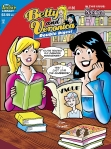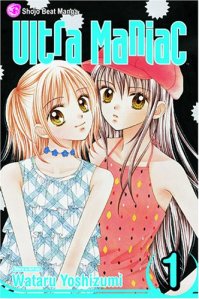 It’s sometimes diverting to consider what comics a comic-book character might enjoy. Yotsuba, the titular heroine of Kiyohiko Azuma’s Yotsuba&! (Yen Press), is pre-school aged and strikes me as more of a doer than a reader anyway. She might enjoy Masashi Tanaka’s wordless, hyperactive Gon (CMX), since it’s got lots of animals in it. But Gon is seinen (it ran in Kodansha’s Morning), and I’ve heard tales of some little kids being perfectly horrified by this story or that. Yotsuba’s pretty sturdy, but you never know what’s going to touch a nerve, as with real kids.
It’s sometimes diverting to consider what comics a comic-book character might enjoy. Yotsuba, the titular heroine of Kiyohiko Azuma’s Yotsuba&! (Yen Press), is pre-school aged and strikes me as more of a doer than a reader anyway. She might enjoy Masashi Tanaka’s wordless, hyperactive Gon (CMX), since it’s got lots of animals in it. But Gon is seinen (it ran in Kodansha’s Morning), and I’ve heard tales of some little kids being perfectly horrified by this story or that. Yotsuba’s pretty sturdy, but you never know what’s going to touch a nerve, as with real kids.
 Given her various phases, she might also be really taken with Akira Amano’s Reborn, just because it features a toddler with a gun. Yotsuba seems like she enjoys a little more grit in her crime drama, so maybe Reborn might be too silly.
Given her various phases, she might also be really taken with Akira Amano’s Reborn, just because it features a toddler with a gun. Yotsuba seems like she enjoys a little more grit in her crime drama, so maybe Reborn might be too silly.
I don’t think she’d have much patience for her own comic. Thinking back on my tastes as a five-year-old, I can’t remember having much interest in slice-of-life narrative. I might have liked the fact that the protagonist seemed to interact exclusively with people older than herself, since those were also my companions of choice. Back then, I tended to read a lot of Casper and Richie Rich. It now strikes me that Casper was wasting his afterlife, and I think Yotsuba would click more with the Ghostly Trio. I was a child in the early 1970s, so I can’t possibly judge how any other kid dresses, but even I knew Richie looked like a tool, no matter how swank his mansion was. He was like Thurston Howell the Fourth.
 I liked to read up, so my pre-super-hero drug of choice was Archie. More accurately, it was Betty and Veronica. Like the gay uncle I would someday become, I think I wanted to advise them both to trade up even then, and they cultivated a lifelong interest in unlikely female friendships. But gender politics aside, I always liked reading about their part-time jobs, their dates, and their various high-school woes. It didn’t do a thing to prepare me for actual high school, which was horrible, but it was a nice safe space in which to imagine what high school might be like, at its best.
I liked to read up, so my pre-super-hero drug of choice was Archie. More accurately, it was Betty and Veronica. Like the gay uncle I would someday become, I think I wanted to advise them both to trade up even then, and they cultivated a lifelong interest in unlikely female friendships. But gender politics aside, I always liked reading about their part-time jobs, their dates, and their various high-school woes. It didn’t do a thing to prepare me for actual high school, which was horrible, but it was a nice safe space in which to imagine what high school might be like, at its best.
There’s something of that to Wataru Yoshizumi’s Ultra Maniac (Viz), an all-ages, five volume shôjo series about a magic-school dropout who transfers to a regular human junior-high school in our world. (Junior high school was even more horrible than high school, but I can’t remember any specific pieces of fiction lying to me about that.)
 Nina, the inept witch, meets Ayu, the pretty and poised seventh-grader who’s carefully cultivated a calm, cool and collected exterior because the boy she likes said that’s what he likes. Ayu helps Nina out with something minor, and Nina tries to return the favor with magic. Alas, Nina sucks at magic, so Ayu usually ends up in some humiliating state. Betty and Veronica cross over with Lucy and Ethel. There are some genuinely funny bits in the early going.
Nina, the inept witch, meets Ayu, the pretty and poised seventh-grader who’s carefully cultivated a calm, cool and collected exterior because the boy she likes said that’s what he likes. Ayu helps Nina out with something minor, and Nina tries to return the favor with magic. Alas, Nina sucks at magic, so Ayu usually ends up in some humiliating state. Betty and Veronica cross over with Lucy and Ethel. There are some genuinely funny bits in the early going.
It might be disappointing when Yoshizumi turns her attention to romantic possibilities for the girls, but she does something unusual. Instead of romance driving a wedge between the girls via jealousy or feelings of abandonment, it brings them closer. Nina works hard to help Ayu be happy, and Ayu returns the favor. They’re prepared to make sacrifices for each other because they genuinely like each other and friendship comes first.
 That’s an idealistic message, obviously, but it’s leavened by the fact that Yoshizumi’s female leads have great chemistry. Their various love interests aren’t really anything to write home about – nice boys, but nobody to lose sleep over, if you know what I mean. What they aren’t is domineering and jerky, as some shôjo princes can be. They respect girl power even before they realize how much of it Nina and Ayu can wield when they put their heads together.
That’s an idealistic message, obviously, but it’s leavened by the fact that Yoshizumi’s female leads have great chemistry. Their various love interests aren’t really anything to write home about – nice boys, but nobody to lose sleep over, if you know what I mean. What they aren’t is domineering and jerky, as some shôjo princes can be. They respect girl power even before they realize how much of it Nina and Ayu can wield when they put their heads together.
Re-reading the series to write this, I see some flaws that weren’t evident the first time through, as it was released by Viz. There’s a long chunk in the later volumes with a rather generic rival rearing her pretty head. She’s nowhere near as vivid or internally consistent as the stars, so it’s hard to take her mischief seriously. There’s also something mawkish about her motives, and bits of her back story are a little on the bleak side. That’s not necessarily a fatal flaw, and Yoshizui has doled out disappointments and sadness prior to this, but it still seems tonally off.
But Yoshizumi corrects before she wraps things up, giving Nina a lovely and unexpected reward for her good intentions and occasionally successful good deeds. And Yoshizumia consistently rewards readers for sweet, well-drawn stories featuring a generally charming cast. It’s on the short side, it’s got magic and romance and comedy, and it gives younger readers a completely unrealistic glimpse into the terrifying world of junior high. What more could you want?


